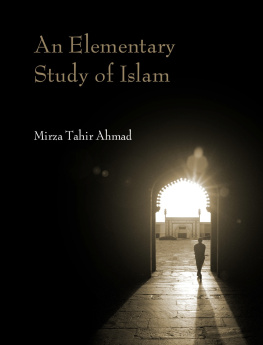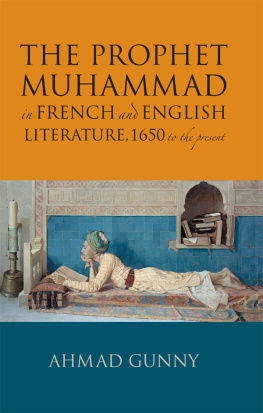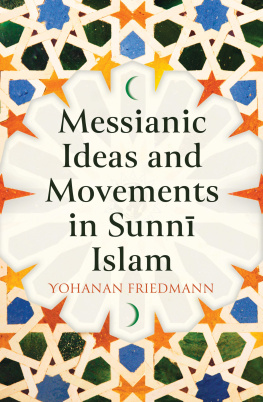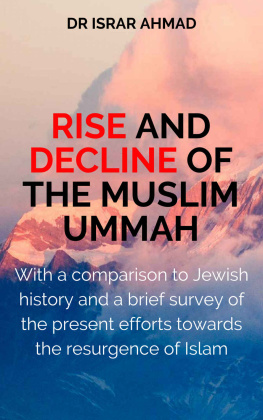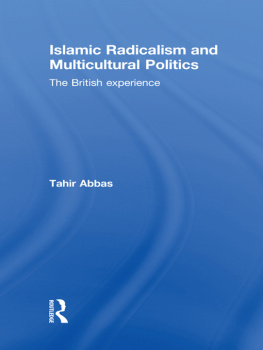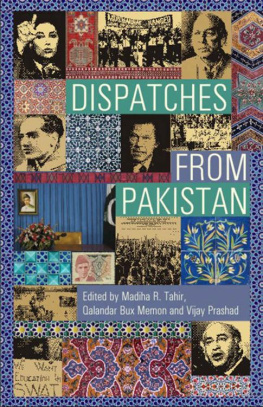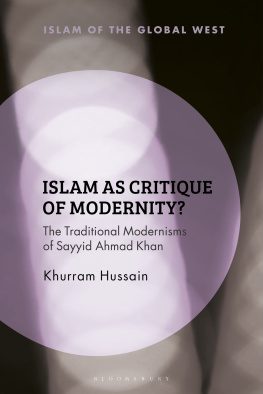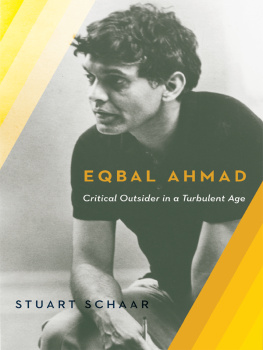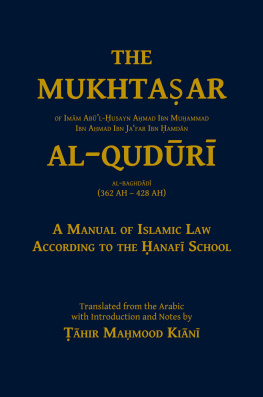Hadhrat Mirza Tahir Ahmad - An Elementary Study of Islam
Here you can read online Hadhrat Mirza Tahir Ahmad - An Elementary Study of Islam full text of the book (entire story) in english for free. Download pdf and epub, get meaning, cover and reviews about this ebook. year: 1997, publisher: Islam International Publications, genre: Religion. Description of the work, (preface) as well as reviews are available. Best literature library LitArk.com created for fans of good reading and offers a wide selection of genres:
Romance novel
Science fiction
Adventure
Detective
Science
History
Home and family
Prose
Art
Politics
Computer
Non-fiction
Religion
Business
Children
Humor
Choose a favorite category and find really read worthwhile books. Enjoy immersion in the world of imagination, feel the emotions of the characters or learn something new for yourself, make an fascinating discovery.
- Book:An Elementary Study of Islam
- Author:
- Publisher:Islam International Publications
- Genre:
- Year:1997
- Rating:5 / 5
- Favourites:Add to favourites
- Your mark:
- 100
- 1
- 2
- 3
- 4
- 5
An Elementary Study of Islam: summary, description and annotation
We offer to read an annotation, description, summary or preface (depends on what the author of the book "An Elementary Study of Islam" wrote himself). If you haven't found the necessary information about the book — write in the comments, we will try to find it.
An Elementary Study of Islam — read online for free the complete book (whole text) full work
Below is the text of the book, divided by pages. System saving the place of the last page read, allows you to conveniently read the book "An Elementary Study of Islam" online for free, without having to search again every time where you left off. Put a bookmark, and you can go to the page where you finished reading at any time.
Font size:
Interval:
Bookmark:
About This Book
This book is a brief introduction to the five fundamentals articles of the Islamic faith. The articles of faith, which all Muslims believe in, are: Unity of God, Angels, Prophets, Holy Books and Life after Death.
Throughout the book, the author emphasises the areas of similarities between Islam and other religions. He shows how religious teachings evolved through the ages culminating in the complete, perfect and universal teachings of Islam.
The author further argues that it is this universal nature of Islam which renders it the religion capable of uniting people from all the nations of the world under one banner of Peace and Submission.
Copyright
An Elementary Study of Islam
by Mirza Tahir Ahmad
Copyright by Islam International Publications Ltd.
First published in English 1985
Reprinted 1997, 2003
Present edition 2010
Published by
Islam International Publications Ltd.
Islamabad, Sheephatch Lane
Tilford, Surrey GU10 2AQ
Printed at
Raqeem Press
Islamabad, Tilford, Surrey
Cover design by Salman Muhammad Sajid
Book layout by Dr. Abdul Majid Shah
ePub layout by Masood Nasir
Index prepared by Dr. Abdul Majid Shah and Salman Muhammad Sajid
All rights reserved. No part of this publication may be reproduced, stored in a retrieval system, or transmitted in any form or by any means, electronic, mechanical, photocopying, recording, or otherwise, without the prior written permission of the publisher.
ISBN: 1 85372 562 5
About The Author
arat Mirza Tahir Ahmad (19282003), may Allah have infinite mercy on his soul, a man of God, Voice articulate of the age, a great orator, a deeply learned scholar of phenomenal intelligence, a prolific and versatile writer, a keen student of comparative religions was loved and devoutly followed by his more than 10 million Ahmadi Muslim followers all over the world as their Imam, the spiritual head, being the fourth successor of arat Mirza Ghulam Ahmad (the Promised Messiah and Mahdi(as)), to which august office he was elected as Khalfatul Mas in 1982.
After the promulgation of general Zia-ul-Haq anti-Ahmadiyya Ordinance of 26th April 1984 he had to leave his beloved country, Pakistan, and migrated to England from where he launched Muslim Television Ahmadiyya International (MTA) which would (and still does) telecast its programmes 24 hours a day to the four corners of the world.
Besides being a religious leader, he was a homeopathic physician of world fame, a highly gifted poet and a sportsman.
He had his schooling in Qadian, India, and later joined the Govt. College, Lahore, Pakistan, and after graduating from Jmi'ah Ahmadiyya, Rabwah, Pakistan with distinction, he obtained his honours degree in Arabic from the Punjab University, Lahore. From 1955 to 1957 he studied at the School of Oriental and African Studies, University of London.
He had a divinely inspired and very deep knowledge of the Holy Quran which he translated into Urdu. He also partially revised and added explanatory notes to the English translation of the Holy Quran by arat Maulaw Sher Ali(ra). Revelation, Rationality, Knowledge and Truth is his magnum opus.
Though he had no formal education in philosophy and science, he had a philosophical bent of mind and tackled most difficult and abstruse theological-philosophical questions with great acumen and ease and his intellectual approach was always rational and scientific. For a layman he had an amazingly in-depth knowledge of science, especially life sciences which attracted him most. He also had deep knowledge of human psychology. His was an analytical mind of high intelligencean intellect scintillating with brilliance, capable of solving knottiest problems with ease, leaving his listeners and readers spellbound.
Foreword
On March 12, 1990, at the invitation of the Department of Islamic Studies, Seville University, Spain, Hadhrat Mirza Tahir Ahmad(rh) delivered an address entitled Islam A Discourse on its Elementary and Fundamental Teachings. He was advised by the Head of the Department to introduce Islam at an elementary level, keeping in view that most of the audience, drawn from other departments and the general public, would have very little knowledge of Islam. The time allotted for the speech was limited to one hour. He provided a brief introduction to the Islamic faith and touched upon a variety of very important topics. He showed how religious teachings have evolved over time culminating in the complete and universal teachings and emphasised the areas of similarities between Islam and other religions.
This treatise has been developed out of that speech. The author has expanded on various themes, which time didn't permit him in the original lecture. Additionally, in converting the spoken word into writing, certain changes and amendments were also effected by the speaker himself. In this book he highlighted the salient characteristics especially the universal nature of Islam which renders it capable of uniting the people from all the nations of the world under one banner of peace. The author brought this short treatise to a close, with an earnest appeal to the leadership of the world religions: 'The quest for peace is a matter of human survival, and as such should not be taken lightly.'
May Allah Almighty make this booklet a source of enlightenment and guidance to help understand the basic teachings of Islam for all. Ameen.
Introduction
After the traditional recitation and reciting the Surah Al-Ftia (the opening chapter of the Holy Quran), the Head of Jam'at Ahmadiyya commenced as follows:
I consider it a singular honour that the Department of Islamic Studies, Seville University has thought it fit to invite me here this evening to address you on the fundamental teachings of Islam. Before I came, I was advised that I should speak on the basics of Islam so that the students who are not well versed in this subject and who have only an elementary knowledge should be able to understand. That surprised me indeed. It surprised me in the first place because I was expecting university students to have fared better. Secondly, I was surprised because Spain has a long history of contact with Islam. Yet for it to have lost that contact so completely as to have erased even the faintest impression, is astonishing indeed! Here I am today to introduce to you the basic teachings of Islam.
When I visited Spain in 1982 to inaugurate a mosque built by the Ahmadiyya Community, which incidentally was the first mosque to be built here after a break of five hundred years, many eyebrows were raised. During my press conference I was repeatedly confronted with the same questions as to why we should come to Spain. What was the purpose? Was there any sinister motive attached to this exercise? Haven't we had enough of Islam? Should we take it to be a new form of the invasion of Spain? My reply to all such questions was, 'Yes, I have come to invade Spain, but not with the intention of winning territories by the sword, but to win hearts with a message of love and persuasion.'
That reply still holds good. We as a community in Islam are not built on the same pattern as the commonly perceived image of Islam on the reflecting mirror of the so-called fundamentalists. Today therefore, I will endeavour to present Islam to you not with reference to the Muslim behaviour in different countries, but with reference only to the basic teachings of Islam found in the divine book, the Holy Quran, and the conduct and traditions of the Holy Founder(sa) of Islam.
Islam means peace. Therein lies the soul and spirit of Islam. It is ironic that this religion of peace is understood today in the West as the religion of war, terrorism, chaos and disorder. While in reality Islam is not only peace in name, but peace pervades all its teachings, and works as the key to its understanding. If translated literally, the second meaning of the word Islam is
Next pageFont size:
Interval:
Bookmark:
Similar books «An Elementary Study of Islam»
Look at similar books to An Elementary Study of Islam. We have selected literature similar in name and meaning in the hope of providing readers with more options to find new, interesting, not yet read works.
Discussion, reviews of the book An Elementary Study of Islam and just readers' own opinions. Leave your comments, write what you think about the work, its meaning or the main characters. Specify what exactly you liked and what you didn't like, and why you think so.

